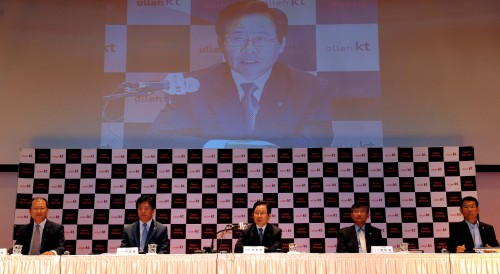KT Corp., the country’s biggest fixed-line service provider, plans to introduce a smart working system for its employees beginning next month.
KT said Monday that it will build flexible working centers -- remote working spaces where users can bring their laptops to do company work -- in nine different locations in the greater Seoul area by this year. It then plans to expand the figure to a total of 30 by 2012, according to Suk Ho-ick, vice chairman of the corporate relations group at KT.
The government is also promoting the smart working environment by unveiling its goal of boosting the share of “smart workers” to 30 percent of the employed population by 2015.
The remote offices, which will take online reservations from company workers, will be equipped with teleconference rooms and spaces called “quiet rooms” which may be used for duties that require privacy.
“What is necessary to make the new working system successful is to add innovation to the way we work and go after a fresh work style to transform the style of the firm as a whole,” Suk said.
KT said Monday that it will build flexible working centers -- remote working spaces where users can bring their laptops to do company work -- in nine different locations in the greater Seoul area by this year. It then plans to expand the figure to a total of 30 by 2012, according to Suk Ho-ick, vice chairman of the corporate relations group at KT.
The government is also promoting the smart working environment by unveiling its goal of boosting the share of “smart workers” to 30 percent of the employed population by 2015.
The remote offices, which will take online reservations from company workers, will be equipped with teleconference rooms and spaces called “quiet rooms” which may be used for duties that require privacy.
“What is necessary to make the new working system successful is to add innovation to the way we work and go after a fresh work style to transform the style of the firm as a whole,” Suk said.

This indicates that the subscribers of a specified group of workers -- mothers, research and development workers and support department employees -- will be obliged to perform tasks at their home offices or smart working centers through the system, he said.
“Women will be given up to a two-year term after child delivery and they may choose to work utilizing the smart working system or even continue self-development by completing the company-offered online educational program during the period,” said Suk.
“This eventually would solve the social issues such as low birth, avoiding of marriages and childcare problems for women as well as improve the quality of life for them.”
The first nine smart working centers will be established at Nowon, Yangcheon, Seocho, Yangjae and Jamsil in Seoul and Goyang, Anyang and two in Bundang, Gyeonggi Province.
“The reason KT is focusing on the new working style is because we already have the key infrastructure in place and it is deemed to become the fundamental element of our future growth engine,” said Kim Il-yung, senior executive vice president and head of corporate center at KT. “We also believe it will become the transformation enabler for the business.”
KT will first test it at company-level and then further expand the effort if the new system proves to be successful, said Kim.
What differentiates it from the mobile working system is that consulting, solutions and management services related to the smart working service will also be provided, he added.
According to KT, the introduction of the new system to 3.5 million KT workers is projected to reduce the commute by 25,000 hours and curb carbon dioxide emissions by 550,000 tons and cut direct expenses by 330 billion won.
Smart work has been implemented and practiced actively for over a decade in other countries like the United States and Netherlands.
The portion of people making use of the system reached 49 percent for employed people in the Netherlands in 2007 and over 15 percent for those in the U.S. in 2008. Japan also plans to double the ratio of smart workers by this year, said KT officials.
Korea’s ratio of smart workers currently stands at about 1 percent of the working population.
By Cho Ji-hyun (sharon@heraldcorp.com)



![[AtoZ into Korean mind] Humor in Korea: Navigating the line between what's funny and not](http://res.heraldm.com/phpwas/restmb_idxmake.php?idx=644&simg=/content/image/2024/04/22/20240422050642_0.jpg&u=)


![[Herald Interview] Why Toss invited hackers to penetrate its system](http://res.heraldm.com/phpwas/restmb_idxmake.php?idx=644&simg=/content/image/2024/04/22/20240422050569_0.jpg&u=20240422150649)
![[Graphic News] 77% of young Koreans still financially dependent](http://res.heraldm.com/phpwas/restmb_idxmake.php?idx=644&simg=/content/image/2024/04/22/20240422050762_0.gif&u=)

![[Exclusive] Korean military set to ban iPhones over 'security' concerns](http://res.heraldm.com/phpwas/restmb_idxmake.php?idx=644&simg=/content/image/2024/04/23/20240423050599_0.jpg&u=20240423171347)





![[Exclusive] Korean military to ban iPhones over security issues](http://res.heraldm.com/phpwas/restmb_idxmake.php?idx=652&simg=/content/image/2024/04/23/20240423050599_0.jpg&u=20240423171347)



![[Today’s K-pop] Ateez confirms US tour details](http://res.heraldm.com/phpwas/restmb_idxmake.php?idx=642&simg=/content/image/2024/04/23/20240423050700_0.jpg&u=)